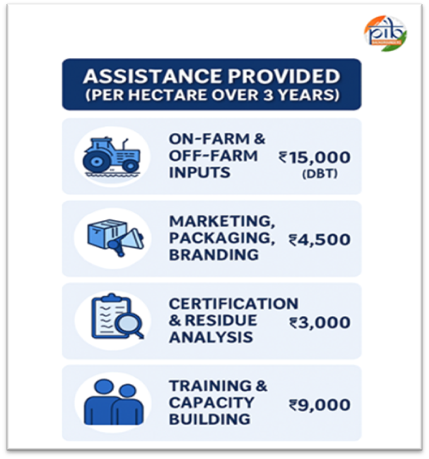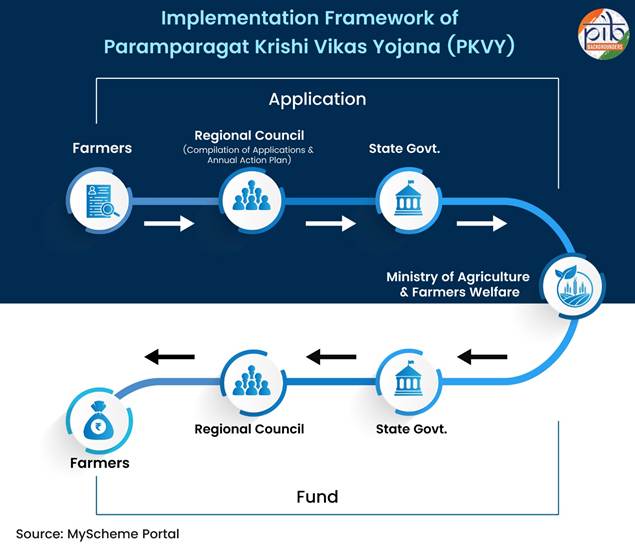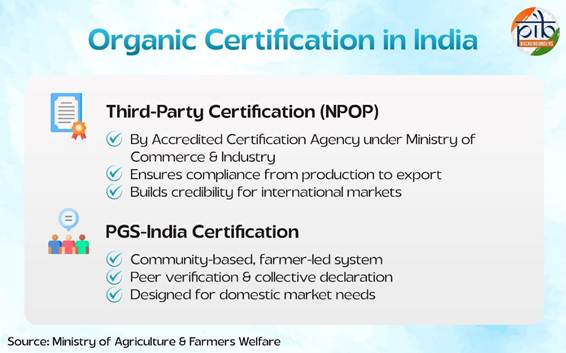Farmer's Welfare
PKVY: Nurturing Organic Farming in India
Nurturing Organic Farming, Empowering Farmers, Strengthening Rural India
Posted On:
06 OCT 2025 11:03AM
Key Takeaways
- As on 30.01.2025, ₹2,265.86 crore released under PKVY (2015–25).
- ₹205.46 crore released for PKVY under RKVY in FY 2024–25.
- Around 15 lakh hectares under organic farming; 52,289 clusters formed; 25.30 lakh farmers benefitted (as of Feb 2025).
- By Dec 2024, 6.23 lakh farmers, 19,016 local groups, 89 input suppliers, and 8,676 buyers registered on Jaivik Kheti portal.
|
Indian agriculture has always drawn strength from traditional knowledge and sustainable practices. Yet, with the rapid growth of input-intensive farming, concerns over soil degradation, water quality, and food safety have become more pressing. Recognising the need to restore ecological balance while improving farmers’ livelihoods, the Government of India launched the Paramparagat Krishi Vikas Yojana (PKVY) in 2015 under the National Mission for Sustainable Agriculture.
Over the last decade, PKVY has grown into a cornerstone of India’s organic farming movement. It has provided farmers with an organised platform to adopt eco-friendly practices, access organic certification, and link with markets that reward sustainable production. What began as a cluster-based initiative is now an ecosystem of training, certification, and market development, shaping India’s long-term vision for resilient agriculture.
Building the Foundation: Cluster-Based Organic Farming
At the heart of PKVY lies the cluster approach. Farmers are mobilised into groups of 20 hectares each to collectively adopt organic farming methods. This model not only ensures uniform standards but also reduces costs by encouraging resource-sharing.
Since its inception, thousands of such clusters have been formed across states, enabling farmers to reduce dependence on chemical inputs, improve soil fertility through organic amendments, and adopt diversified farming systems. Training and capacity-building sessions have been central to this process, equipping farmers with practical skills and confidence to make the transition.
The objective of the PKVY is to advance a scalable model of eco-agriculture that integrates low-cost, chemical-free techniques with farmer-led collectives, enhancing food safety, income generation, and environmental sustainability.
- Promote eco-friendly farming that improves soil health and conserves natural resources.
- Enable farmers to grow crops using natural methods, reducing reliance on chemical inputs.
- Lower farming costs and increase incomes through organic practices.
- Produce healthy, chemical-free food for consumers.
- Protect the environment by using traditional, low-cost techniques.
- Support farmer collectives for farming, processing, and certification.
- Build entrepreneurship by linking farmers directly to local and national markets.
Under Paramparagat Krishi Vikas Yojana (PKVY), farmers adopting organic farming practices are being assisted with ₹31,500 per hectare for a three-year period. The support is structured as follows:
- On-farm & off-farm organic inputs: ₹15,000 (DBT)
- Marketing, packaging & branding: ₹4,500
- Certification & residue analysis: ₹3,000
- Training & capacity building: ₹9,000

This holistic support ensures that farmers not only adopt organic practices but also receive help with certification, branding, and market linkages for better income generation.
The implementation of the Paramparagat Krishi Vikas Yojana (PKVY) follows a structured, farmer-centric approach. All farmers and institutions are eligible to apply under the scheme, subject to a maximum landholding limit of two hectares.
Farmers begin the process by approaching their Regional Councils, which are responsible for guiding them through enrolment and certification. These Councils compile the individual applications into an Annual Action Plan, which is then submitted to the Ministry of Agriculture & Farmers Welfare for approval.

Once the Annual Action Plan is sanctioned, funds are released by the Central Government to the State Government, which further channels them to the Regional Councils. The Councils, in turn, disburse assistance directly to farmers through the Direct Benefit Transfer (DBT) mechanism. This ensures that financial support under PKVY — covering inputs, training, certification, and marketing — reaches beneficiaries in a transparent and timely manner.
Through this structured framework, PKVY ensures that small and marginal farmers across India can access organic farming support seamlessly, while maintaining accountability at every stage of implementation.
A major barrier for organic farmers in the past was the absence of credible certification. PKVY addressed this through two distinct systems:
1. Third-Party Certification (NPOP): Implemented by Accredited Certification Agency under the National Programme for Organic Production (NPOP) of the Ministry of Commerce and Industry, this system ensures compliance with international standards. It covers the entire value chain — from production and processing to trading and exports — enabling Indian farmers to access and expand in global organic markets.
2. Participatory Guarantee System for India (PGS-India): Operated under the Ministry of Agriculture & Farmers Welfare, this is a farmer-centric, community-based certification. Farmers and producers collectively participate in decision-making, peer inspections, and mutual verification of practices, ultimately declaring the produce as organic. PGS-India caters primarily to the domestic market, providing affordable and inclusive certification access to small and marginal farmers.

In 2020–21, the Government launched the Large Area Certification (LAC) programme to fast-track certification in regions where chemical farming has never been practiced (tribal belts, islands, eco-preserved zones). The LAC reduces the conversion period from 2–3 years to few months, enabling quicker certification, higher incomes, and enhanced global competitiveness for India’s organic sector.
By combining these systems, PKVY has created credibility for Indian organic products in both domestic and international markets. Farmers are now better positioned to capture price premiums, access niche consumers, and strengthen local brands rooted in organic identity.
Over the last decade, PKVY has transitioned organic farming from a niche practice to a mainstream agricultural movement, contributing to sustainable agriculture, rural digitization, and inclusive market access aligned with Digital India and Atmanirbhar Bharat.
- As on 30.01.2025, ₹2,265.86 crore released under PKVY (2015–25).
- ₹205.46 crore released for PKVY under RKVY in FY 2024–25.
- Around 15 lakh hectares under organic farming; 52,289 clusters formed; 25.30 lakh farmers benefitted (as of Feb 2025).
- Work continues in existing 1.26 lakh hectares area adopted in 2023–24; 1.98 lakh hectares new area under three-year conversion in 2024–25.
- In 2023–2024, 50,279 hectares in Dantewada, Chhattisgarh and 4,000 hectares in West Bengal adopted under LAC.
- As on 31.12.2024, 9,268 FPOs registered under the Central Sector scheme for “Formation and Promotion of 10,000 FPOs.”
- 14,491 hectares in Car Nicobar & Nancowry Islands declared certified organic under LAC.
- Entire 2,700 hectares cultivable land in Lakshadweep certified organic.
- 60,000 hectares in Sikkim supported with ₹96.39 lakh under LAC, now Sikkim is the only 100% organic state in the World under LAC.
- Proposal for 5,000 hectares from Ladakh supported with ₹11.475 lakh under LAC.
- By Dec 2024, 6.23 lakh farmers, 19,016 local groups, 89 input suppliers, and 8,676 buyers registered on Jaivik Kheti portal.
The Jaivik Kheti Portal has been developed as a dedicated online platform to promote the direct sale of organic products from farmers to consumers.
Over the last decade, the Paramparagat Krishi Vikas Yojana (PKVY) has emerged as a pivotal initiative in advancing sustainable agriculture in India. By promoting organic farming through a cluster-based approach, the scheme has empowered lakhs of farmers to reduce dependence on chemical inputs, improve soil health, and produce safe, high-quality food. Complemented by certification systems, digital platforms such as Jaivik Kheti, and market linkages, PKVY has created an enabling ecosystem for both domestic consumption and international trade in organic produce.
The scheme’s expansion into Large Area Certification (LAC) and integration with the National Mission on Natural Farming (NMNF) further reflects the Government’s commitment to eco-friendly, low-cost farming models. With continued focus on training, certification, and entrepreneurship, PKVY is not only strengthening rural incomes but also contributing to environmental conservation, climate resilience, and the vision of an Atmanirbhar Bharat.
As India steps into the next phase of its agricultural transformation, PKVY stands as a testament to how traditional practices, when combined with modern systems and digital tools, can pave the way for a greener, healthier, and more prosperous future.
References:
§ Press Information Bureau (PIB) Releases
- https://www.pib.gov.in/PressReleasePage.aspx?PRID=2045560
- https://www.pib.gov.in/PressReleasePage.aspx?PRID=2099756
- https://www.pib.gov.in/PressReleasePage.aspx?PRID=2146939
- https://www.pib.gov.in/PressReleaseIframePage.aspx?PRID=1946809
- https://www.pib.gov.in/PressReleaseIframePage.aspx?PRID=2100761
- https://www.pib.gov.in/PressReleaseIframePage.aspx?PRID=1739994
§ Ministry of Agriculture & Farmers Welfare Documents
- https://agriwelfare.gov.in/Documents/AR_Eng_2024_25.pdf
- https://agriwelfare.gov.in/Documents/Revised_PKVY_Guidelines_022-2023_PUB_1FEB2022.pdf
§ Parliament Questions (Lok Sabha)
- https://sansad.in/getFile/loksabhaquestions/annex/183/AU2315_sWTC0p.pdf?source=pqals
- https://sansad.in/getFile/loksabhaquestions/annex/182/AU2474_HV55PI.pdf?source=pqals
Click here to see pdf
****
SK/SM
(Backgrounder ID: 155346)
Visitor Counter : 197
Provide suggestions / comments
Read this release in:
Hindi